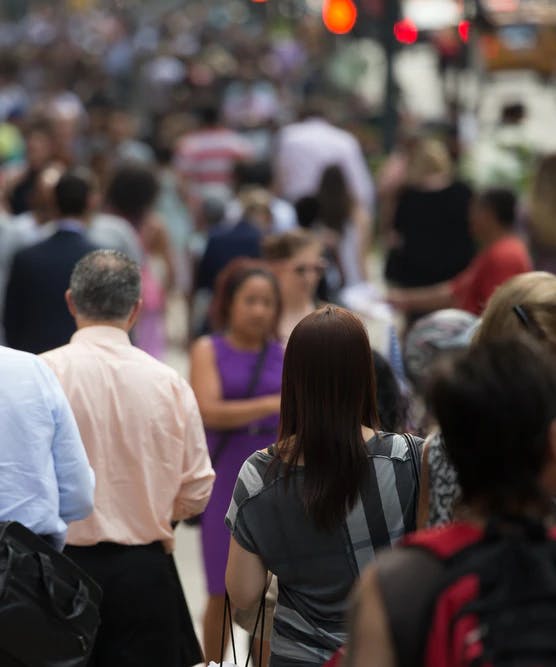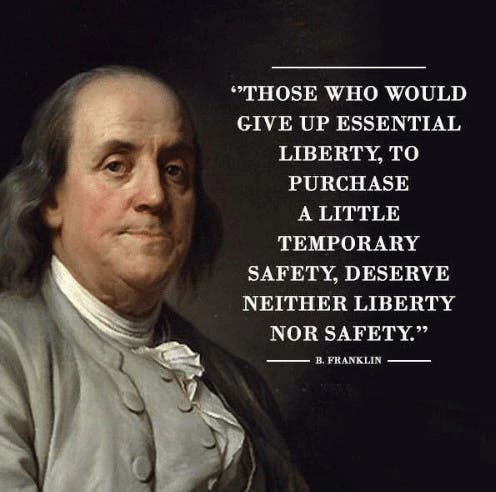Google Wants To Use People-Tracking Software To Fight Covid-19, And It's Eerily Similar To China's Social Credit System
One of the worst things about this coronavirus crisis is the constant in-fighting between people of differing political views in America. It’s terrible because, if ever there were a time that we should come together and work with each other, it’s during this time of international disaster brought on by COVID-19.

Apple and Google have teamed up to develop an app-based contact tracing system to track people who are infected with the virus. The owner of a smartphone would be notified if they came into contact with someone who later tested positive for COVID-19. From there they could self-isolate or get tested for the infection themselves.
One of the solutions proposed is the implementation of an app-based contact tracing system to track people who are infected with the virus.
Here are two articles from The Economist and Wired Magazine about the technology behind these tracking apps. To simplify how this technology works, it basically uses your Bluetooth signal to keep track of who you came into contact with by gathering data and records from other phones that were in your proximity.
So imagine if you were grocery shopping and you happened to walk down an aisle with someone who was later found to be positive for the COVID-19 virus. You would receive a notification that you had been in contact with someone who had the virus, and you would be required to self-isolate or get tested.
Now that we understand how the technology works, here are some of the reasons we should be skeptical about the implementation of this technology.
Tracking the Clusters of Infections and Containing the Spread
According to Bostonomix, since contact tracing will be automated, public health officials will be able to employ data from the app to determine the source of infection and how it’s spreading. They will then be able to call the affected individuals to figure out if they need to be tested, isolated, or quarantined.
It will help the public health authorities to contain the epidemic by determining the high-risk clusters of infection.
With the information acquired from the app that traces the source of a community’s COVID-19 outbreak, it’ll help make early diagnosis possible and get care to the people who need it. The idea is that it will help the public health authorities to contain the epidemic by determining the high-risk clusters of infection.
Requirements for the App To Work
When we look at countries which have successfully dealt with this pandemic — such as Singapore (11 deaths), Taiwan (6 deaths), Iceland (9 deaths), and Hong Kong (4 deaths) — these are all countries that implemented the use of technology to help trace and track the spread of the COVID-19 virus.
Singapore managed to persuade over 600,000 of their citizens to use a Bluetooth app called Trace Together, and it successfully identified clusters of infection and contained new outbreaks. Taiwanese President Tsai Ing-wen hinted in her Time magazine article that one of the main methods which helped Taiwan’s management of the outbreak was the tracking system which monitored those under quarantine.
Take note that in order for the contact tracing app to work properly and be effective, it has to be adopted en masse by the general population. The countries that have successfully stymied the spread of the virus are smaller nation states. The same method may not be as feasible to implement in a large country like America because of the difference in size.
Also, we need to consider that we don’t currently know for certain that a contact tracing system is a necessary part of successfully stemming the spread of COVID-19. Australia and New Zealand, for example, have had great success in dealing with the pandemic, and these countries have not implemented the use of contact tracing in their response to the crisis.
Losing of Privacy and Civil Liberties
One of the most long-lasting problems which would occur from the adoption and implementation of these tracking apps is how it could potentially serve as a tool of oppression by the government. We have seen the horrifying ways that the Chinese Communist government hunted down infected individuals, turned neighbors against neighbors, and kept those who were infected at home by welding their doors shut so they couldn’t leave their quarantine.

Admittedly, these extreme measures will probably never be taken by the American government because Americans are protected by their Constitution and such draconian measures are unconstitutional. Nevertheless, there is always the danger of other infringements of rights through these technologies.
Edward Snowden warned that governments might exploit these massive data-gathering infrastructures by justifying that they have the right to engage in a massive breach of privacy in an event of another pandemic or terrorist attack. The setting up of a massive public surveillance has always been one of the slow steps to total authoritarian tyranny.
To help put the threat of government overreach in perspective, take a look at how China has been abusing the collection of citizens' information through their social credit system. What was first sold as a benign system of security and social convenience by the government turns out to be a nightmare surveillance state where whistle-blowers who speak up against the government are silenced.
Hackers and Security Issues
Unfortunately, even in this trying time where just about everyone around the globe is suffering hardships brought upon by the coronavirus, there are still some who would choose to add to the world’s problems by engaging in unethical and downright destructive behavior like hacking and stealing information.
Imagine the risk involved once we have a large system in place whereby the public will provide their data and information to the cloud.
There has been case after case of cybersecurity threats, including an incident where hackers attacked the U.S. Department of Health and Human Service computer systems in an attempt to undermine public health officials’ response to mitigating the virus. Now imagine the risk involved once we have a large system in place whereby the public will provide their data and information to the cloud. We’ve already experienced hackers hijacking apps such as Zoom and scams that involve spyware apps that prey on those who are panicking over the coronavirus threat.
Potential Rise of Monopoly Collusion for an Unproven Solution
There are some criticisms about why the trace contact app won’t be effective. Critics cite that unless we can amass the majority of people to be onboarded onto the app, it would be difficult to make them work effectively. The one way we can ensure massive participation is for tech giants like Google and Apple to come together in creating this massive infrastructure.
This act does bring up the question of future consolidations of both companies. Like Peter Thiel, I don’t think that monopolies are necessarily bad. However, these tech giants don’t exactly have a sterling reputation when it comes to serving the public interest. This unprecedented truce between these two companies might spell a new era for collusion on a massive scale, and once that creature is formed, there will be almost no stopping it. Smaller competitors won't be able to stem their overreaching grasp and potentially unethical behavior.
Closing Thoughts
Knowing the risks that come with the implementation of the app-based contact tracing system, perhaps it would be wise to think through the loss of privacy if you signed up for this service. There still isn’t any real data that proves the effectiveness of these apps. In the meantime, the downside outweighs the benefits in the sense that we will be giving up so much of our privacy and civil liberties in the long run for the sake of adopting something that might or might not work in the present.
As mentioned earlier in the article, the best way to come through this crisis is to stop focusing on our differences and instead work together to defeat this virus as fast as we can for our own sake. We might not even need to employ the use of the app if everyone takes it upon themselves to act responsibly in this crisis by wearing masks and keeping their distance from others at all times.